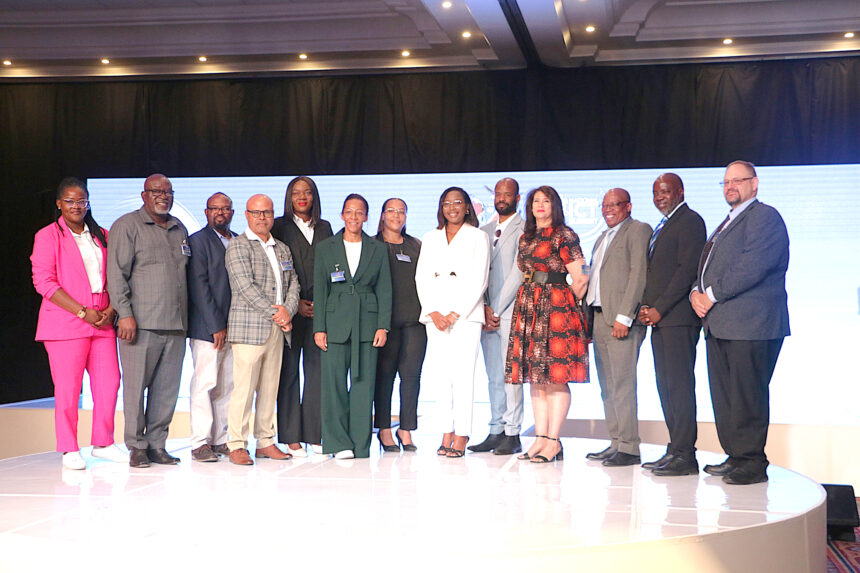Rudolf Gaiseb
The highly anticipated eighth National Information and Communication Technology Summit, held at the Mercure Hotel and Resort on 11 September 2024, ended on a high note after successfully identifying trends and challenges in the rapidly evolving industry.
The well-attended summit highlighted looming opportunities of digital advancement waiting for Namibia.
Held under the theme: ‘Building Resilience to ‘Adapt or Die’ in the Era of Digital Transformation and Artificial Intelligence’, this year’s summit brought together hundreds of tech experts, political leaders, innovators, researchers, policymakers and other ICT industry players whose networking and collaborative engagement were set to chart the country’s fate in digital advancement.
The annual event also attracted the youth, who were impressed by the intricacies of the emerging new technologies, such as artificial intelligence, which is expected to be broadly integrated in various sectors and diverse applications.
The first day of the summit started with an informative keynote speech by the Minister of Information and Communication Technology, Emma Theofelus, who highlighted the opportunities for digital growth in Namibia.
She, however, warned that while embracing the power of digital transformation and artificial intelligence, which are reshaping every facet of Namibian lives, the government must focus on ensuring digital transformation benefits all Namibians and drives sustainable development across all sectors in the country.
“Digital technologies are transforming the way we deliver public services and engage citizens. From e-governance to digital health and education, these technologies offer new ways to improve service delivery and enhance the quality of life for our people. We must leverage these technologies to make government services more accessible, efficient, and responsive to the needs of our citizens. The country must not only adapt to technological changes but also build a robust and resilient framework that can withstand the rapid pace of these advancements,” she said before cutting the ribbon to officially open the summit exhibition.
This marked the opening for exhibitors, including innovators, entrepreneurs, and researchers, old and young, to present innovative ideas and solutions, first to the minister, then to the attending crowds, as they marketed themselves and their businesses, explaining how these would help revolutionise Namibia’s digital landscape.
The ministry’s director of ICT developmement, Linda Nakale was able to warm the cold feet of those sceptical about data protection, cybersecurity, and other manoeuvres of personal data that come with the integration of AI during her overview of the national digital strategy.
The ministry, with local and international partners, has developed a national digital strategy that will narrow the digital divide, promote digital literacy, provide access to citizen-centric digital public services, and create greater economic opportunities for all Namibians.
The CEO of the National Commission on Research, Science, and Technology (NCRST), Anicia Peters, also discussed Namibia’s AI readiness, including AI regulatory frameworks and promotion of AI innovation.
She said some African countries, including Namibia, are not at the development and design forefront of AI and are therefore unable to embed their cultural values, stereotypes, and norms within the systems, like AI start-ups and designers of AI solutions in the developed world.
“Namibia’s climate change challenges, including those in green infrastructure, water energy, food security, health and geopolitics, can be solved by AI,” she said.
Peters also highlighted the opportunities for youth and AI’s role in advancing research, science, technology, and innovation, saying young people can approach the commission when in need of funding to embark on projects in the relevant fields.
Head of the India-Namibia Centre of Excellence in Information Technology (INCEIT), of the Namibian University of Science and Technology, Arpit Jain, said during his presentation, organisations need high-performance computing (HPC) to solve complex problems, process large volumes of data, and gain a competitive edge in their respective fields.
He was speaking on the role of high-performance computing in digital transformation, data science, and artificial intelligence, concerning AI. He illustrated how industries face several challenges related to computational resources and how that can hinder efficiency, innovation, and competitiveness.
“A wide range of problems are addressed by AI in HPC. It can improve performance and increase speed by classifying, clustering, anomaly detection, employing continuous estimations, and also creating a set of outputs that optimise for an objective function. HPC helps in managing and analysing vast amounts of data from sensors and IoT devices to improve city infrastructure, traffic management and delivering public services,” he said.
On the second day of the summit, communications, knowledge, and technology minister of Botswana, Thulagano Segokgo, opened the event with discussions on collaboration and innovation and kept the AI talk rolling.
He said Namibia and Botswana can learn from other countries that have already advanced in digitalisation.
“Of these countries we can learn from; some have adopted at the top to be innovation hubs, and therefore their efforts are characterised by a focus on specific areas that enable them to conceptualise and commercialise new technologies and solutions. Some have opted to be service powerhouses and focus on the development of software, content and service delivery.
“We note a disheartening aspect that our economies are not integrated with the global ICT value chain. The exploitation of open data as a commodity requires managing data as an asset for economic transformation. This will lead to agricultural improvement, preventative health actions, road safety, emergency response, encouragement of start-ups and entrepreneurs, and identifying fraud patterns in public acquisitions, among others,” he said.



